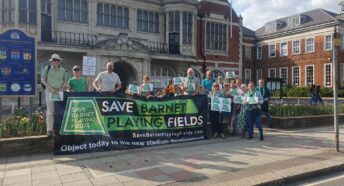Manston DCO examination starts in Margate

The next phase in deciding the fate of the Manston airport site began this week.
The Planning Inspectorate’s examination into RiverOak Strategic Partners’ application for a Development Consent Order was marked by the preliminary meeting held at Margate Winter Gardens on Wednesday (January 9).
The meeting, which was open to the public, comprised discussion of procedural matters only – this was not an event for debate on the merits or otherwise of the application.
Three representatives of CPRE Kent (director Hilary Newport, Thanet chairman David Morrish and environment committee member Chris Lowe) were present as the four-strong Examining Authority clarified issues and some of those who had made Relevant Representations (known as Interested Parties) made themselves known.
The examination, which will take six months, will determine whether the RSP plan to reopen the site as an aviation freight hub should be regarded as a Nationally Significant Infrastructure Project.
If it does, the Secretary of State for Transport (currently Chris Grayling) can grant seizure of the site.
During the period of the examination, Interested Parties will be asked to give further written details of their views, while there will also be public hearings.
When the examination is concluded, the Planning Inspectorate has three months to prepare a report and recommendation for the Secretary of State, who then himself has three months to decide on the application.
Finally, there is a six-month period when that decision can be challenged in the High Court.
At Wednesday’s preliminary meeting, chaired by lead examiner Kelvin MacDonald, CPRE Kent asked that an Issue Specific Hearing be scheduled for climate-change considerations.
Among the 2,052 Relevant Representations posted on the examination website (“an almost unprecedented number for a national infrastructure application,” according to Mr MacDonald), site owner Stone Hill Park Ltd, which has plans for some 4,000 homes, business units and sporting facilities at Manston, has prepared a 668-page document laying out its principal objections to the application – primarily that the planned operation was not nationally significant and there were doubts about viability and national need.
CPRE Kent’s next involvement with the examination will be the presentation of an expanded written representation by Friday, February 15 (revised from February 8).
- To listen to Wednesday’s preliminary meeting, click here
- For more on Manston, see here, here,here and here
- For CPRE Kent’s response to RSP’s Manston Consultation last year, see here
Friday, January 11, 2019
- A number of important documents have yet to emerge. For example, a rigorous transport plan and a finalised air-quality assessment. The latter is critical given that allocations at Teynham will feed extra traffic into AQMAs.
- There seems to be no coherent plan for infrastructure delivery – a key component of the plan given the allocations being proposed near the already crowded Junction 7.
- There seems to have been little or no cooperation with neighbouring boroughs or even parish councils within Swale itself.
The removal of a second consultation might have been understandable if this final version of the plan were similar to that being talked about at the beginning of the consultation process. It is, however, radically different in the following ways:
- There has been a major shift in the balance of housing allocations, away from the west of the borough over to the east, especially around the historic town of Faversham. This is a move that raises many concerns.
- A new large allocation, with accompanying A2 bypass, has appeared around Teynham and Lynsted, to which we are objecting.
- Housing allocations in the AONB around Neames Forstal that were judged “unsuitable” by the council’s own officers have now appeared as part of the housing numbers.
- Most of the housing allocations being proposed are on greenfield sites, many of them on Grade 1 agricultural land – a point to which we are strongly objecting.
Concerns about the rush to submit the plan
The haste with which the plan is being prepared is especially worrying given the concentration of housing in Faversham. If the town is to take a large amount of new housing, it is imperative that the policies concerning the area are carefully worked out to preserve, as far as possible, the unique nature of the town. The rush to submit the plan is likely to prove detrimental.
As Swale does not have a five-year land housing supply, it is open to speculative development proposals, many of which would run counter to the ideas contained in the current plan. Some are already appearing. This is a common situation, and one that, doubtless, is a reason behind Swale’s haste.
Our overriding fear, however, is that this emphasis on haste is ultimately going to prove counterproductive. This is because it is our view that the plan, in its current form, is unlikely to pass independent examination. We are urging Swale to listen to and act upon the comments being made about the plan and to return the plan to the council with appropriate modifications before submitting it to the Secretary of State.
Essentially, this means treating the current consultation not as the final one but as the ‘lost’ second consultation.
The consultation ends on Friday 30 April and we strongly urge residents to make their opinions known if they have not already done so.
Further information








